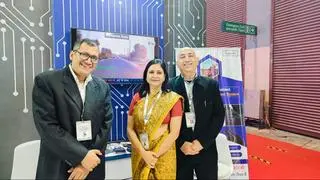One brings the technical and academic knowledge, and expertise. The other brings in years of experience marketing and selling medical equipment. The two have combined to take to market a unique technology that was so far confined to the laboratory at the Indian Institute of Technology Madras – that of using haptics, or the science of touch – to making simulators to train medical professionals.
The two – M Manivannan, Professor in the Biomedical Engineering Group, Department of Applied Mechanics, IIT Madras, and PBC Paul, with over two decades of experience in the healthcare industry – have come together to bring to market a range of products to make training healthcare professionals on various procedures simpler. Two of these products, a laparoscopy surgical simulator and an in-vitro fertilisation training simulator, both with haptics feedback, have been launched.
Merkel Haptic Systems Pvt Ltd, the company founded by Manivannan, has licensed these products to a Singapore-based company for about $1 million. The products integrate virtual reality with haptics to change the way doctors and medical professionals are trained.
A mechanical engineering graduate, Manivannan completed his Master’s and Ph.D from the Indian Institute of Science, Bengaluru, before heading to the US, for a post-doctoral fellowship in haptics at MIT. He served as chief software architect of Yantric Inc, a spin-off company of MIT Touchlab, before joining IIT Madras in June 2005. He set up Merkel Haptic Systems, of which he is the Founder Chairman, at IITM’s Touchlab. Paul, an electronics engineering graduate from Bangalore University, worked with two multinational companies, before joining Merkel Haptic Systems as its Chief Executive Officer, with a 30 per cent equity stake in the venture, in 2016.
Commercial productsManivannan had taken up a few projects, all inside the laboratory, but none that was commercially implemented. That was when Merkel Haptic’s advisory board suggested that Manivannan develop products commercially. The advisory board includes S Gopalakrishnan, one of the founders of Infosys; MM Murugappan, Vice-Chairman, Murugappa Group; Steven M Lavalle, one of the inventors of Oculus; Mandayam Srinivasan, Director, TouchLab, MIT, Boston; and, Swami Manohar, who has expertise in computer graphics, visualisation and virtual reality. It was in 2016 after he joined Merkel Haptic, says Paul, that Manivannan and he drew up a strategy plan for the company.
They decided not to follow the mannequin model – where the training is done on a mannequin – that other medical equipment companies do. Instead, they decided to integrate haptics with simulation, where with a head-mounted device, the persons will get a virtual view of the anatomy and thanks to haptics, they will actually feel the needle being moved or the probe being inserted. When they do this procedure in real life for the first time, it will appear as if they have done it before, says Paul.
Merkel Haptic, according to Paul, has built the software and programmed into the head-mounted device. There are a few more similar products in the pipeline, including one for advanced cardiac life support, for reducing infant mortality rate and one that helps doctors prepare for a neuro surgery. “We are working on nine products,” adds Paul.
The idea in licensing out the products is Merkel Haptic does not want to get into their manufacture as the company’s expertise is in technology. Merkel Haptic ensures that the products it licences are made in India so that they are much cheaper than imported ones. To give an idea of the cost, says Paul, a fertility simulator available in the market costs about ₹50 lakh, that too one without haptics feedback, whereas a simulator made by Merkel with haptics feedback will cost about ₹25 lakh. On an average, the cost will be lower by at least 40 per cent on all ranges of products, says Paul.
Manivannan says the challenge is to quickly get more products into the market, before competition gets a foothold.
He is confident that India can be a good base for low-cost manufacture of simulators with world class quality. “We can then export them,” he adds.








Comments
Comments have to be in English, and in full sentences. They cannot be abusive or personal. Please abide by our community guidelines for posting your comments.
We have migrated to a new commenting platform. If you are already a registered user of TheHindu Businessline and logged in, you may continue to engage with our articles. If you do not have an account please register and login to post comments. Users can access their older comments by logging into their accounts on Vuukle.